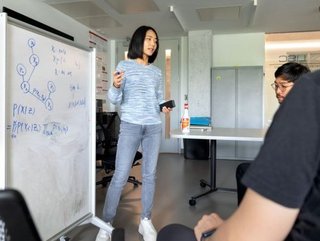AI predicts human game player actions with 80% accuracy

Researchers in the United States have developed a new set of algorithms which predict volleyball players’ in-game actions with more than 80% accuracy, opening up a wealth of new opportunities for human-machine interaction.
The new algorithms developed in Cornell University’s Laboratory for Intelligent Systems and Controls combine visual data with information that is more implicit, which might include an athlete’s specific role on the team. The lab is now collaborating with the university’s Big Red hockey team to expand the research project’s applications.
The ability to anticipate human actions has a great deal of potential for human-machine interaction outside of the world of sport, says Silvia Ferrari, the John Brancaccio Professor of Mechanical and Aerospace Engineering who led the research. The software can help autonomous vehicles make better decisions, help robots and humans work more effectively, and improve video games by enhancing the computer’s artificial intelligence.
“Computer vision can interpret visual information such as jersey colour and a player’s position or body posture,” sys Ferrari. “We still use that real-time information, but integrate hidden variables such as team strategy and player roles, things we as humans are able to infer because we’re experts at that particular context.”
Ferrari and doctoral students Junyi Dong and Qingze Huo trained the algorithms to infer hidden variables by having them watch games and use machine learning to extract data from the videos. The algorithms used this data to help make predictions when shown a new set of games.
AI algorithms help with video analysis and data technology
The results were published in the journal ACM Transactions on Intelligent Systems and Technology, and show the algorithms can infer players’ roles – distinguishing a defence-passer from a blocker, for example – with an average accuracy of nearly 85%. The research was supported by the Office of Naval Research and commercialisation efforts are being supported by the Cornell Office of Technology Licensing.
Ferrari says she envisions teams using the algorithms to prepare for competition by training them with existing game footage of an opponent and using predictive abilities to prepare specific plays and game scenarios.
Ferrari has filed for a patent and is now working with the Big Red men’s hockey team to further develop the software. One goal of the project is to help annotate game film, which is a tedious task when performed manually without computer assistance.
“Our program places a major emphasis on video analysis and data technology,” says Ben Russell, Director of Hockey Operations for the Cornell men’s team. “We are constantly looking for ways to evolve as a coaching staff in order to better serve our players. I was very impressed with the research Professor Ferrari and her students have conducted thus far. I believe that this project has the potential to dramatically influence the way teams study and prepare for competition.”






